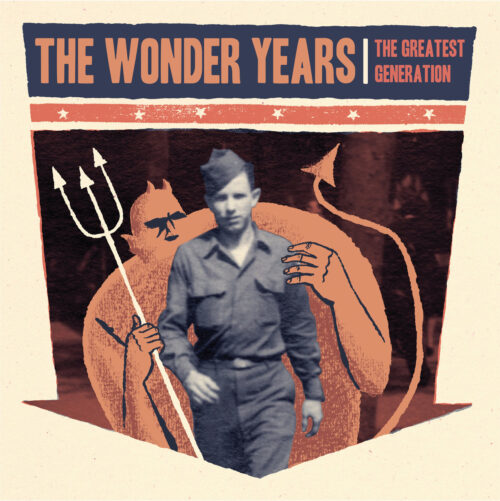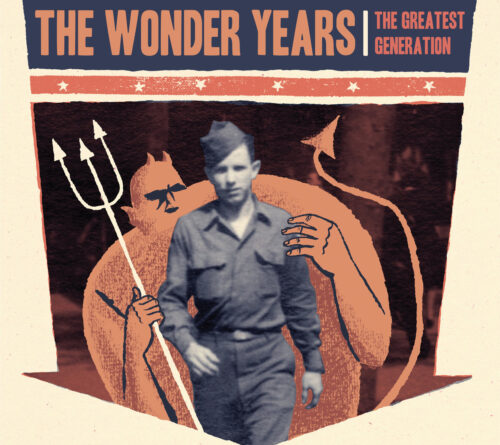HEAVY MUSIC HISTORY: The Greatest Generation – The Wonder Years
When BLINK-182 asked about their age again, it inspired a generation of pop punk bands who swore to never grow up, happy to dick around with their friends for as long as people kept buying tickets. They sat atop a genre known for its upbeat and carefree nature, soundtracking skater videos and crude coming of age movies. It wasn’t entirely ‘no thoughts, head empty’, but what thoughts were there were generally adolescent: girls, partying, this town sucks.
They weren’t alone in doing so, but THE WONDER YEARS spearheaded mainstream pop punk’s maturity in the 21st century, and in the years leading up to The Greatest Generation had garnered acclaim for their energetic shows and carefully crafted lyricism. Third album Suburbia I’ve Given You All And Now I’m Nothing was influenced by Allen Ginsberg’s poem America, infusing Dan ‘Soupy’ Campbell’s songs about growing up with a literary edge. Already the band had stirred up real devotion in fans by focusing on specificities; they are no TAYLOR SWIFT, but Campbell sings names and places as if we know who he knows, hang out where he hangs out, fostering a familiarity and intimacy with listeners. When the band came out swinging, we weren’t all lucky enough to be near that South Philly basement, but it felt like we were.
Fast-forward two years and the band would release The Greatest Generation in May 2013, the third part in a trilogy that started with 2010’s The Upsides, and which saw them break down the limitations of the scene they were born into. It set them up to be taken more seriously (the band’s latest albums have since been reviewed by the influential Pitchfork) while wisely growing older with their fanbase who already felt like THE WONDER YEARS were ‘their’ band. This was the same band singing songs about the same places, but now they were contemplating being left behind, generational trauma, and how they no longer felt young and invincible.
Initial reviews were effusive. Thomas Nasiff of Absolute Punk wrote: “It is my firm belief that The Greatest Generation has no real precedent in this community. It’s my belief that there isn’t another band in pop-punk right now that can write a record this good.” He refused to even give it a rating, while most other publications gave the record fours and fives. It was contemporarily treated as another pop-punk record, but, listening back ten years later, it’s a limiting label for a band who had more to say and more ways of saying it. The up-tempo An American Religion (FSF) has its DNA in the genre they came from, but the album is generally slower and more cinematic, with acoustic ballads and a seven-minute epilogue that acts like an end credits scene. In fact, by revisiting most of the preceding tracks, I Just Want To Sell Out My Funeral is like the so-called flashes experienced before death, reliving the journey before a moment of finality.
If pop-punk soundtracks coming of age, then this was whatever comes next. A quarter-life crisis? With lines like “Jesus Christ, I’m twenty six, all the people I graduated with all have kids, all have wives, all have people who care if they come home at night”, maybe. We Could Die Like This features a prominent “I wanna die in the suburbs’”refrain, almost comic in the way Campbell is already longing for something most people fight so hard to escape from in their early 20s, nostalgic for the familiarity and comfort our younger selves reject. Yet what followed The Greatest Generation was greater success, taking the band all across the globe. Home would feel even further away on 2018’s Sister Cities, where Campbell sings “I buy you a candle, not even sure what it means” on its opening track, a tribute to his grandfather whose funeral he missed while boarding a flight to Japan. ‘They’ll hold your service tomorrow, I’m an ocean away” is a heartbreaking and world-weary line that would never fit on The Greatest Generation, when THE WONDER YEARS were thinking of their place among cities and urban sprawls, not knowing they would soon have to think of their place among the entire world.
Maybe it is that grounded uncertainty that resonated with so many. Campbell didn’t know when he sang “I was kinda hoping you’d stay” on Passing Through A Screen Door that he’d be able to sing “I’m glad that you stayed” on No Closer To Heaven two years later. For a movie comparison, it is like Richard Linklater’s Before Sunset (2004), its protagonists no longer filled with youthful enthusiasm, dreams unrealised and with no idea where they are going. “All the kids’ names I’ve ever liked are tied to tragedy”, Campbell sings on The Greatest Generation. “Your name, your name, your name, your name’s the only one I like” he’d sing nine years later, married, with a son called Wyatt. In 2013, he could never know that the answer would come, and it’s that desperate questioning that makes The Greatest Generation so raw, honest, touching, and evergreen.
It is an inherently transitional record, moving away from something and towards something else. Some things change, like finding a name, while some don’t, like Campbell‘s depression. In The Devil In My Bloodstream, the album’s emotional highlight, he accepts the same blood coursing through his great-grandfather’s veins will come for him eventually. He cannot avoid the mental health he inherits, and on 2022’s The Hum Goes On Forever sings “I don’t wanna die, or maybe I do, ‘cause everything’s so fucking dark, you found me crying in the other room” in response to his postpartum depression. There are countless lyrical and thematic threads across all of THE WONDER YEARS’ records, and it is as if they are all on the highway during The Greatest Generation, speeding to escape while in a rush to an uncertain destination. Ten years later, we know they are all still on Campbell‘s mind.
The Greatest Generation may be THE WONDER YEARS’ magnum opus. Partly because it came at the right time, aging simultaneously with their fans who had the same existential questions on their minds; something that timely and profound can’t be created in the studio. But the diaristic penmanship, the expert sequencing of its tracks, the maturation in their sound, that was all on them. As layered as a novel and as textured as a 35mm film, on The Greatest Generation, THE WONDER YEARS did all that they could with what they were given.

The Greatest Generation was originally released on May 14 2013 via Hopeless Records.
Like THE WONDER YEARS on Facebook.

